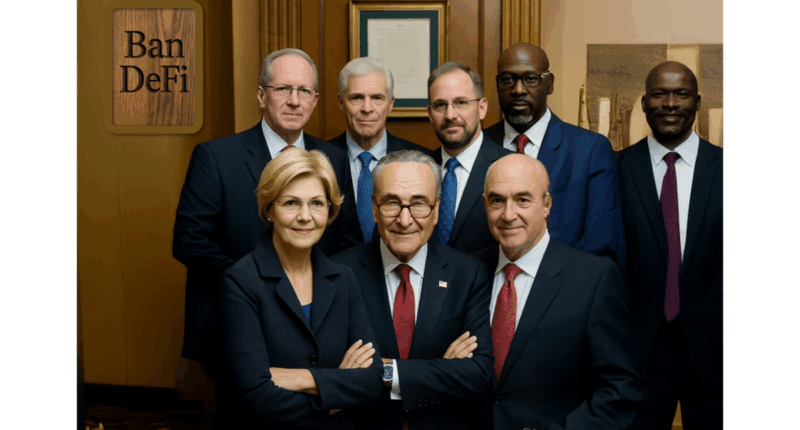Share this @internewscast.com
The bipartisan initiative to advance the CLARITY Act, a significant cryptocurrency regulation bill in the U.S., is facing obstacles due to proposed restrictions on decentralized finance (DeFi) by Democrats. This proposed legislation aims to delineate oversight responsibilities between the SEC for securities-like tokens and the CFTC for commodities like Bitcoin.
Initially, Republicans intended to push the CLARITY Act forward by the end of 2025, building on prior legislative efforts such as the recently passed GERNIUS Act. However, a leaked proposal from Democrats on DeFi has sparked substantial controversy, with critics suggesting it effectively bans key crypto innovations.
The Core Dispute: DeFi Proposal Under Fire.
The controversy centers on a Democratic document revealing plans for the Treasury Department to curate a “restricted list” of high-risk DeFi protocols. This measure could enforce Know Your Customer (KYC) protocols on non-custodial wallets and app frontends, making them subject to SEC-CFTC regulations. Senate Banking Committee Chair Tim Scott (R-S.C.) and other Republicans argue this undermines DeFi’s decentralized nature and could push innovation abroad.
- Republican Critique: Senate Banking GOP Staff Director Catherine Fuchs halted further talks via email, stating negotiations would pause “until we have an agreed upon date for markup.” A spokesperson for Scott, Jeff Naft, dismissed the proposal as “not a legislative offer,” noting it “was not written in legislative text, included multiple incoherent policy ideas, and was not a good-faith effort.” Republicans had shared drafts since June 27 and pushed back a planned September markup to September 30 for bipartisanship, but Democrats have resisted committing to a vote date.
- Democratic Defense: Sen. Ruben Gallego (D-Ariz.), a key negotiator in a group of 12 crypto-friendly Democrats, pushed back through spokesperson Jacques Petit: “Democrats have shown up ready to work but our Republican counterparts are crashing out. They asked for paper and substance, and we delivered.” Petit called demands for a markup date premature—”like setting a wedding date before the first date”—and accused Republicans of leaking the proposal to manufacture outrage. Broader Democratic concerns, voiced by Ranking Member Elizabeth Warren (D-Mass.), center on crypto’s risks to financial stability and national security.
The Elizabeth Warren Problem
Senator Elizabeth Warren, known for her critical stance on cryptocurrencies, is perceived as protecting banking interests by opposing crypto under the guise of addressing “fraud, instability, and risks.” She consistently advocates for stringent controls, positioning herself as a bulwark against crypto-induced instability in financial markets.
Warren is committed to building an “anti-crypto army” to ensure compliance, emphasizing that crypto must align with existing securities laws and avoid providing avenues for financial instability.
Her outspoken stance has jeopardized legislative efforts like the GENIUS Act, as her influence looms over negotiations conducted by Senate Democrats with limited comprehension of cryptocurrencies.
The so called “crypto-friendly” Democratic bloc—including Sens. Kirsten Gillibrand (D-N.Y.), Mark Warner (D-Va.), Angela Alsobrooks (D-Md.), and Cory Booker (D-N.J.)—insist they’re committed to a deal, but the DeFi language all but proves they’re preserving the banking cartel as Warren’s lap dogs. Gallego himself emphasized in a late-Thursday interview: “We’re going to continue working. But we are still in the fight to make sure we have a bipartisan market-structure bill.
Industry and Public Backlash – The proposal has drawn swift condemnation from the crypto sector, amplifying partisan divides. Blockchain Association CEO Summer Mersinger warned it “would effectively ban decentralized finance, wallet development, and other applications in the United States—an outcome that’s neither workable nor consistent with American innovation.”
Coinbase CEO Brian Armstrong echoed this on October 9, calling it “bad, plain and simple” and a setback for U.S. leadership, potentially pushing DeFi offshore.
Advocacy groups like Coin Center have mobilized, arguing the burdens would stifle small DeFi projects and talent migration to places like Singapore or Dubai.
| Stakeholder | Position | Key Quote/Concern |
|---|---|---|
| Republicans | Oppose DeFi restrictions; demand markup vote | “Leaking private communications… shows one side is more focused on political narratives than serious work.” |
| Democrats | Push for consumer protections via restricted list | “Republicans’ demand to set a markup date before text is agreed to is… nonsensical.” |
| Crypto Industry (e.g., Coinbase, Blockchain Assoc.) | View as innovation-killer | “Would set US crypto innovation back” (Armstrong); “Ban DeFi… inconsistent with American innovation” (Mersinger) |
| Senator Elizabeth Warren | Broader systemic risks and instability | Concerns over financial stability and national security |
What’s At Stake
This impasse threatens to derail the bill entirely, leaving the U.S. without a unified framework amid a booming crypto market. A failure here could exacerbate regulatory uncertainty, benefiting offshore hubs and echoing the dark past.
Republicans hold leverage with their Senate majority but need Democratic buy-in for longevity. Desperate for traction in the 2026 midterms, Democrats may use this to appeal to risk-averse voters. Optimistically, the “crypto-friendly” Democrats could broker compromises, perhaps softening the restricted list into targeted AML measures.
Pessimistically, Warren’s influence might harden lines, forcing Republicans to advance a partisan version—risking veto or court challenges. As Mersinger put it, “The stakes are high for American innovation.”
Watch for markup commitments in the coming weeks; without them, 2025’s regulatory window slams shut.

















